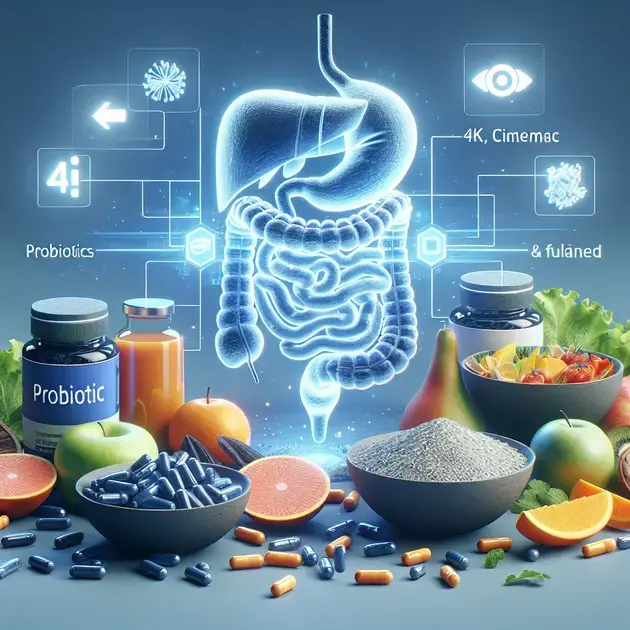Are you looking to boost your gut health with prebiotic probiotic supplements? In today’s fast-paced world, many of us struggle to maintain a healthy gut flora due to factors like stress, poor diet, and antibiotic use.
Fortunately, prebiotic probiotic supplements offer a convenient and effective way to support your gut microbiome, promoting better digestion, nutrient absorption, and overall well-being. Research has shown that these supplements can help restore a healthy balance of gut bacteria, leading to improved immune function and even mental health benefits.

Boosting Gut Health Naturally
Having a healthy gut is essential for overall well-being. One of the most effective ways to boost gut health naturally is by incorporating a diet rich in prebiotic and probiotic foods. Prebiotics are non-digestible fibers that serve as food for the beneficial bacteria in your gut, while probiotics are live bacteria that provide numerous health benefits.
A step-by-step approach to boosting gut health naturally begins with incorporating prebiotic-rich foods such as garlic, onions, asparagus, and bananas into your diet. These foods help promote the growth of good bacteria in the gut. Additionally, consuming probiotic-rich foods like yogurt, kefir, sauerkraut, and kimchi can introduce beneficial bacteria into your digestive system.
Where to Find Information:
For more detailed information on prebiotic and probiotic-rich foods, you can refer to reputable health websites such as Healthline (www.healthline.com). They offer comprehensive guides on the benefits of prebiotics and probiotics and suggest ways to incorporate these foods into your daily meals.
Furthermore, maintaining a balanced diet that includes a variety of fruits, vegetables, whole grains, and lean proteins is crucial for gut health. These foods provide essential nutrients that support the growth of a diverse range of beneficial bacteria in the gut.
Regular exercise also plays a significant role in boosting gut health naturally. Physical activity helps improve digestion, reduce inflammation, and promote overall gut motility. Aim for at least 30 minutes of moderate exercise most days of the week to support a healthy gut.
In addition to dietary and lifestyle changes, consider taking prebiotic and probiotic supplements to further enhance gut health. These supplements can provide concentrated doses of beneficial bacteria and fibers to support the balance of your gut flora.
The Power of Prebiotic Probiotic Supplements
Prebiotic and probiotic supplements offer a convenient way to support gut health, especially for individuals who may have difficulty obtaining an adequate amount of these components from their diet alone. Prebiotic supplements contain fibers that assist in nourishing the beneficial bacteria in the gut, while probiotic supplements provide live bacteria strains that can help improve digestion and boost the immune system.
When considering prebiotic and probiotic supplements, it’s essential to choose high-quality products from reputable brands. Look for supplements that contain a diverse range of bacterial strains and are backed by scientific research to ensure their effectiveness.
Where to Find Information:
To learn more about the best prebiotic and probiotic supplements available on the market, you can visit the Prime Review Mag website (https://primereviewmag.com). They offer in-depth reviews and recommendations for various health and wellness products, including prebiotic and probiotic supplements.
Before incorporating any new supplements into your routine, consult with a healthcare provider or a registered dietitian to determine the most suitable options for your individual needs. They can provide personalized recommendations based on your health goals and any existing medical conditions.
It’s important to follow the recommended dosage instructions provided on the supplement packaging to ensure safe and effective use. Taking prebiotic and probiotic supplements consistently as part of your daily wellness routine can help maintain a healthy balance of gut flora and support overall digestive health.
Maximizing Gut Flora Balance
Optimizing the balance of gut flora is key to promoting better digestion, immunity, and overall health. To maximize gut flora balance naturally, focus on consuming a diverse range of plant-based foods that are rich in prebiotics and probiotics. This diverse intake helps nourish different strains of beneficial bacteria in the gut and supports microbial diversity.
Incorporating fermented foods such as kefir, yogurt, kombucha, and miso into your diet can introduce a variety of probiotic strains that contribute to a healthier gut microbiome. These fermented foods can help improve digestion, enhance nutrient absorption, and strengthen the immune system.
Where to Find Information:
For guidance on optimizing gut flora balance through diet and lifestyle choices, you can explore resources such as the Mayo Clinic website (www.mayoclinic.org). They provide evidence-based information on the benefits of probiotics and prebiotics and offer tips on creating a gut-friendly meal plan.
Reducing the intake of processed foods, sugary beverages, and artificial sweeteners can also support gut flora balance. These items can negatively impact the diversity of gut bacteria and promote the growth of harmful microbes. Instead, opt for whole, nutrient-dense foods to nourish your gut microbiome.
Adequate hydration is essential for maintaining gut health and supporting the growth of beneficial bacteria. Drinking plenty of water throughout the day helps flush out toxins, aids in digestion, and ensures proper functioning of the gastrointestinal tract.
Incorporating stress-reducing practices such as meditation, yoga, and deep breathing exercises can also benefit gut health. Chronic stress can disrupt the balance of gut flora, so finding ways to manage stress effectively is crucial for overall well-being and digestive health.

Enhancing Digestive Wellness Naturally
When it comes to enhancing digestive wellness naturally, there are several important factors to consider. One key aspect is maintaining a healthy diet rich in fruits, vegetables, whole grains, and lean proteins. These foods provide essential nutrients that support digestive health and promote the growth of beneficial gut bacteria.
In addition to a nutritious diet, staying hydrated is also crucial for digestive wellness. Drinking plenty of water helps to keep things moving smoothly through the digestive tract and prevents constipation. Herbal teas and infused water can also provide extra benefits for gut health.
Regular physical activity is another important element in enhancing digestive wellness naturally. Exercise helps to stimulate digestion and promote regular bowel movements. It also helps to reduce stress, which can have a negative impact on digestion.
Managing stress levels is essential for overall digestive health. Stress can disrupt the balance of gut bacteria and lead to digestive issues such as bloating, gas, and indigestion. Practicing relaxation techniques such as meditation, yoga, or deep breathing exercises can help to alleviate stress and support a healthy gut.
Lastly, getting an adequate amount of sleep is crucial for digestive wellness. Lack of sleep can disrupt the body’s natural rhythms and lead to digestive problems. Aim for 7-9 hours of quality sleep each night to support optimal digestion and overall well-being.
Optimizing Gut Microbiome Harmony
Optimizing gut microbiome harmony is key to maintaining good digestive health. The gut microbiome refers to the trillions of bacteria and other microorganisms that live in the digestive tract and play a crucial role in digestion, nutrient absorption, and overall health.
One way to optimize gut microbiome harmony is by consuming probiotic-rich foods such as yogurt, kefir, sauerkraut, and kimchi. Probiotics are beneficial bacteria that help to maintain a healthy balance in the gut microbiome and support digestion.
Prebiotic foods can also help to promote gut microbiome harmony. Prebiotics are non-digestible fibers that serve as food for the beneficial bacteria in the gut. Foods like bananas, onions, garlic, and whole grains are rich in prebiotics and can help to support a diverse and healthy gut microbiome.
Avoiding the overuse of antibiotics is another important factor in optimizing gut microbiome harmony. Antibiotics can disrupt the balance of bacteria in the gut and lead to digestive issues. Whenever possible, choose natural remedies or probiotics to support the body’s immune system and maintain a healthy gut microbiome.
Incorporating fermented foods into your diet can also help to optimize gut microbiome harmony. Fermented foods like tempeh, miso, and kombucha contain beneficial probiotics that can support a balanced and diverse gut microbiome.
Improving Digestive Health with Advanced Supplements
When it comes to improving digestive health with advanced supplements, there are several options to consider. Digestive enzymes are a popular supplement that can help to break down food more effectively and improve digestion. Enzymes like amylase, lipase, and protease can support the body’s natural digestive processes.
Probiotic supplements are another powerful tool for improving digestive health. Probiotics help to replenish the beneficial bacteria in the gut and support a healthy balance in the microbiome. Look for a high-quality probiotic supplement with a diverse range of strains for optimal benefits.
Glutamine is an amino acid that can support gut health and improve digestive function. It helps to maintain the integrity of the intestinal lining and can aid in healing leaky gut syndrome. Incorporating a glutamine supplement into your routine can promote overall digestive wellness.
Fiber supplements can also be beneficial for improving digestive health. Soluble fiber supplements like psyllium husk can help to regulate bowel movements and promote a healthy digestive system. Be sure to drink plenty of water when taking fiber supplements to prevent constipation.
Omega-3 fatty acids are essential nutrients that can also support digestive health. Fish oil supplements contain omega-3s that have anti-inflammatory properties and can help to reduce inflammation in the gut. Adding an omega-3 supplement to your daily regimen can promote a healthy gut and overall well-being.
Conclusion
In conclusion, enhancing digestive wellness naturally involves maintaining a healthy diet rich in essential nutrients, staying hydrated, engaging in regular physical activity, managing stress levels, and getting adequate sleep. These factors collectively support optimal digestive health and overall well-being.
Optimizing gut microbiome harmony is crucial for maintaining good digestive health by consuming probiotic-rich foods, prebiotics, and fermented foods while avoiding the overuse of antibiotics. These practices help to support a diverse and healthy gut microbiome, essential for proper digestion and nutrient absorption.
Improving digestive health with advanced supplements like digestive enzymes, probiotics, glutamine, fiber supplements, and omega-3 fatty acids can further enhance digestive function. These supplements play a key role in supporting the body’s natural digestive processes, maintaining gut health, and reducing inflammation, ultimately contributing to a healthy gut and overall well-being.



